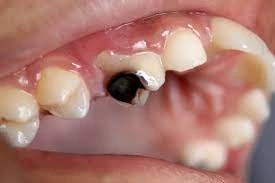Dental cavities, also known as dental caries, are an oral microbiological disease that demineralizes the inorganic and calcified substance and destroys the teeth’ organic portion. It leads to the formation of holes or cavities in your teeth.
Our teeth consist of three layers, the outermost, the most calcified and protective layer is the enamel, the middle is the dentine, and the innermost layer is the pulp. The pulp forms the core of the teeth and consist of connective tissue, nerve and vessels. Dental cavities begin with the destruction or breakdown of enamel and slowly progresses to involve the inner tooth structure until it reaches the pulp and eventually infects the entire tooth.
WHAT CAUSES DENTAL CAVITIES?
The causes of dental cavities are multi-factorial; it involves the bacteria present in your mouth, combined with frequent sugar consumption and faulty oral health care practices.
Dental plaque is a yellowish-grey film that firmly adheres to the tooth structure and the gums.
This plaque houses millions of bacteria; some of these bacteria are disease-causing and are known to cause dental cavities. The sugars we consume act as a source of energy for these bacteria. The bacteria metabolize these sugars to release toxic and acidic by-products into the oral cavity. These acidic by-products are responsible for the breakdown of enamel and dentine, further causing holes in the tooth.
WHO ARE AT A RISK OF SUFFERING FROM DENTAL CAVITIES?
-
Individuals with poor oral hygiene.
-
Presence of misaligned and crowded teeth, which gives a hiding place to the disease-causing bacteria.
-
Consumption of sticky and high sugar-containing foods and liquids.
-
Compromised immunity.
-
Dry mouth.
SYMPTOMS OF DENTAL CAVITIES
The symptoms of dental cavities vary with the severity of the disease. Initially, you may experience no symptoms, but it can lead to intense tooth pain as the disease progresses. This tooth pain can start at any time in the day and increases with the consumption of hot, cold, sweet or sour food beverages, indicating tooth sensitivity.
In cases of extensive tooth decay, the tooth pain will exaggerate when you lie down. This pain can also extend to involve your entire jaw and radiate to the temple region leading to headaches. You may have difficultly chewing and may experience pain biting down. Dental cavities lead to brownish-black discoloration of the teeth, and there will be a visible hole in the affected tooth.
TREATMENT FOR DENTAL CAVITIES
Treatment for dental cavities varies with the extent to which the infection has spread. If the decay is limited to enamel and dentine, your dentist will restore the teeth with dental cement or composite resins after removing the infected part with a dental drill. The destroyed tooth part is rebuilt to its previous anatomy to ensure that the tooth’s shape, size, and strength are restored.
If the decay is more extensive and pulp approaching, calcium hydroxide dressing is applied to the defect as a base, and then the tooth is restored as usual. If the infection has reached the dental pulp, root canal therapy will be carried out to save the tooth. In some cases, where a significant amount of tooth structure has been destroyed, a crown placement will help restore the tooth’s shape, strength and functionality. In cases of severe decay, where most of the tooth has been infected and damaged, our best course of action will be to extract the remaining tooth and then replace it with a dental implant.
If you are experiencing any symptom mentioned above, you may be suffering from dental cavities. Please schedule an appointment with a dentist to get it checked and treated as soon as possible. The gateway to a healthy life is a healthy mouth!


